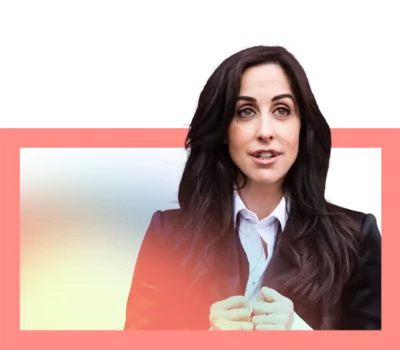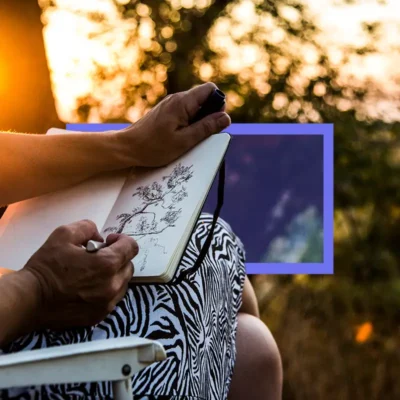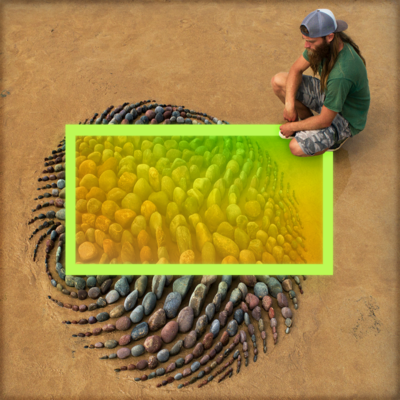Surrendering my old identity — and finding myself
Footloose comic actor or committed mom? After the birth of her first child, Catherine Reitman didn’t think she could be both. And in the tension between two identities, she was starting to feel like no one at all. Sitting in a crappy hotel room, on the brink of exhaustion and heartbreak, she wrote it down, every one of those hard, messy, dark truths. The act of writing shifts more than just her perspective – it’s a shift in fate.


Table of Contents:
Transcript:
Surrendering my old identity — and finding myself
CATHERINE REITMAN: My mom is an extraordinary beauty. She was once an actress, and a director, and a model. And as her career was just brightly unfolding in front of her she sacrificed everything to have me, and my brother, and my sister. She told my dad that she didn’t want to miss our childhoods, that she wanted to give us everything that she had not received as a child. And she did.
ROHAN GUNATILLAKE: Catherine Reitman plays Kate Foster on the sitcom “Workin’ Moms”. In fact, she actually created the show to help her through a time of great transition. Her Meditative Story reminds us of something profoundly important: Sometimes we have to live our way into the shoes we’re already wearing into the person we’re becoming.
In this series, we blend immersive, first-person stories with brief mindfulness prompts from me. I’m Rohan, your guide on this episode of Meditative Story.
Now, let’s ready ourselves to take in Catherine’s Meditative Story. If there’s any tension around, knowing it and letting it be here. If there’s any chaos, letting there be chaos. And if you can notice any calm, any steadiness, any stability, knowing that too. Aware of everything. Allowing anything. Radically honest.
The body relaxed. The body breathing. Your senses open. Your mind open. Meeting the world.
REITMAN: I started off as an actor – a largely rejected one, if I’m being honest. And being an actor is so confusing. You know, you’re in a constant struggle to define your own identity: Can you call yourself an actor if you don’t get work? Can you believe in your own ability if you’re passed over for every role? You’re in this constant state of becoming. But you don’t even feel the confusion until you actually start to work.
Deep in my heart of hearts, I know myself to be grounded, intelligent, loving, self-aware; a sister, a daughter, a girlfriend. But I keep getting typecast as the main girl’s best friend, the confident bitch, or the quirky girl. And every job I get confirms that I should only be paid to play these sort of one-dimensional characters – characters that they see in me but I don’t necessarily see in myself. I look in the mirror and ask, “Wait. Is that who I am?”
As actors, my friends and I dream about what it would mean to get that “one gig”. That one gig that will transform us from aspiring actors to working actors. From working actors to successful actors. That one gig that will launch us into orbit. But my voyage has a very different start.
It’s 2013. I’m pregnant with Jackson, my first son. One month pregnant. It’s that period where you’re not supposed to tell a soul and for good reason. But I have to tell my mom. Now, my mom is an extraordinary beauty. She was once an actress, and a director, and a model. And as her career was just brightly unfolding in front of her she sacrificed everything to have me, and my brother, and my sister. She told my dad that she didn’t want to miss our childhoods, that she wanted to give us everything that she had not received as a child. And she did. She made every single bagged lunch with notes on the front, smoothies after school, kisses right before bed. She devoted herself entirely to being our mom. And I remember always feeling both grateful for it and guilty about it. I was in awe of this choice that she made.
GUNATILLAKE: Is there someone in your life who made the decision to give you the things they never had? Bring them to mind, to heart. Thank you.
REITMAN: So I’m one month pregnant and I go to see my mom. I sit down with her on her very white bed, and share the news. “I’m going to have a baby.” But in her eyes, I see something completely unexpected. Something that she probably would never admit. I see disappointment. She says: “You absolutely have to keep your career.”
It’s clear in this moment. She knows who I am and what’s important to me. She’s giving me a permission slip of sorts to keep going after my dreams.
Six weeks after Jackson is born, I book an independent film. I’m on set in Philadelphia, thousands of miles away from my new son. Oh, and It’s Mother’s Day – my first Mother’s Day as a mom and I’m in Philly. On set, I don’t feel like myself at all. I’ve always been incredibly confident on set, like a well-oiled machine that could operate for hours and never tire. But now, I second-guess everything. I’m exhausted. I know I can’t do the hours I used to normally because I’m rocked.
You know, I’ve always prided myself on being the kind of gal who can hang in a boys’ club, who can give it back as hard as I can take it. But I’m on set in Philadelphia, on Mother’s Day, surrounded by male comedians, and they start teasing me. Hard. One of them offers to send my son a Mother’s Day card on my behalf. Another one asks if my son is calling the nanny “Mom” yet. Everything inside of me crumbles. All of my insecurities are triggered. Not only can I no longer hang with the guys, but I’m not holding up my end of the bargain at home as a mother. I start to cry. I feel broken. And I feel like everyone can see it. I still remember their faces. It was so awkward, and silent.
I race back to my tiny hotel room – this dark, small space with a view of a parking lot. I feel like the walls are reverberating with my own inadequacy. And I sit there alone. Away from home on Mother’s Day. Away from my baby. I’m sleep deprived and struggling with postpartum depression. And I think about how I’m not talented anymore. I’m not pretty anymore. I’m not interesting or funny and I have nothing to contribute other than making sure that the other human being I dragged onto this Earth is going to eat, sleep, and have shelter. And I’m somehow not even doing that well.
I’ve surrendered the identity I had before: that actor who could work non-stop and hang with the guys. But I haven’t lived into who I will become next. What a miserable place to be.
GUNATILLAKE: We all live with self-judgment. The inner critic can be difficult to bear. Can you see Catherine in her room, in this moment? Imagine her thoughts. Take a deep breath and let those thoughts go on the exhale.
REITMAN: I reach for my cell phone to call my husband, Philip. I tell him everything. And he very wisely says: “You gotta write this down.” And I thought: “Oh, no. I’m gonna become some sad person who just writes her sad stories in a diary.” I hang up the phone. And at that moment, I can’t see any value in what’s happened to me. But I also can’t keep it inside.
I do what Philip says and I write it all down. I don’t see myself as a writer. The whole idea of writing totally intimidates me. Writers are smart. Am I smart enough? But I start to write, and it comes out fast. The words are tumbling out of me. And before I know it, I’m looking at six really messy but very true scenes. I write about crying on set in Philadelphia on Mother’s Day. I write about having to pump in every bathroom stall, car trunk, and horse stable available on set. I write about everything I’ve experienced as I try to live my previous life – without acknowledging that things have changed. I’ve changed. My old life doesn’t fit anymore. And I haven’t grown into my new life yet.
As I read through the scenes, I see the way all the things that happened to me were humiliating and hard, but also, in hindsight, funny. And in these stories – these honest, wrenching stories – I start to see a bridge from the old me, the scrappy, funny, hungry actor, to the new me that I haven’t fully become yet.
And my friends help me bridge that gap. When you live in Los Angeles as an actor, and you’re constantly being rejected, you make a lot of friends who are struggling in the same way. People who want to create stories so badly that they’ll just lend a hand to help you make anything. I borrow people’s equipment. I beg my actor friends. And we up shooting eight minutes worth of material based off of those six scenes that I wrote. It’s the most honest thing I’ve ever done. And it changes everything.
A few weeks later, I’m sitting in a restaurant in a hotel in downtown Toronto across from the general programming manager, Sally Catto, of the CBC. She’s watched those scenes I filmed with my friends. But as she speaks about the material. It’s not the way that casting directors, producers, directors, executives have spoken to me about creative in the past. She’s speaking about my material as if it were her own story.
It’s in this moment that I know that this new show isn’t just a chance for me to have a gig, to work regularly. But it’s also the chance to tell the stories that I, and so many other women in my position, have felt.
Sally green-lit the season. Thirteen episodes. I get the opportunity to write, act, and run my own weird TV show. We call it “Workin’ Moms”. If the show is to be what I want it to be, it means exposing it all. Showing my breasts, my body; delving into my postpartum depression and my innermost darkness. It means laughing at myself, and, yes, self-deprecation. It means revealing myself in ways that will change my relationships with everyone I know: my husband, my family, my neighbors.
The week after we premiere, my uncle reaches out to me, frustrated that I hadn’t prepared him for the amount of nudity there would be in the show. I hang up with him feeling pretty terrible. But the great irony is that my future would be riddled with these sort of conversations – expanding as far as the principal of my son’s school.
It’s now 2016, I’m pregnant with my second son, Liam, and I’ve assembled an all-female writing staff for Workin’ Moms. But now, I’m sitting in the writers room, with seven women who have far more experience writing than I do. And they’re staring at me, and I worry that they’re thinking, “God, this was a mistake. Who’s this pregnant chick? She’s out of her mind.” I feel as though I don’t fit into the shoes that are now on my feet.
But then something happens.
I go into orbit. And it wasn’t some Hollywood orbit, where you rise like a rocket and become an instant star. It was a personal orbit. A growth period like I’ve never experienced. I have to take this quantum leap from an occasionally working actress with two children and a husband to the lead writer, director, and actor on my own show, where 200 people on set, every single day, look at me and say, “What’s next?” And I don’t yet fit the shoes on my feet. But I launch into orbit by telling my own truth, and I know it’s the right path.
When you’re surrounded by people who are far more talented and experienced than you, you have two choices. You can sit back and watch, go dormant. Or you can rise to the occasion.
GUNATILLAKE: Rise to the occasion. If you’re sitting or standing, can you lift up your chin just a bit, open out your chest? You can be subtle, but try it. Let your body mirror Catherine’s intention.
REITMAN: In my first year on the set, I just felt fear. I felt like a total phoney. I have to fake it until I make it. But I pivot and learn until I’m a bit more comfortable. Day by day, I grow into the role. I grew into the shoes that are already on my feet. And I remember the moment this hits me. Now, I live on a hill and I drive to work under all these beautiful trees that sort of meet together and form a canopy over the street. And I’m driving down that hill to the writer’s room for season one. And the dappled light is shooting down through the leaves. And I feel like I’m sitting on one of the branches, looking down at myself I’m so proud. I was like, “Holy cow. This is gonna work. This is gonna work. This is gonna work.”
One day on the set during that first season, I bring Liam to work with me. He’s three months old and my milk had completely stopped. My body was just like, “Nope, too much pressure.” And I’m filming in a tiny little house and I have to breastfeed on camera. In the scene as it’s written, my character’s son rejects being fed. It’s the irony that my character has won all day at work but when she gets home she loses. Now the twin boys who play my child on the show are fast asleep. And since my little guy Liam happens to be visiting on set, I decide to use him in the scene instead.
Quietly to myself, I’m thinking, “This is going to be perfect. He’s going to reject me since I’m no longer making milk, and it’s going to be this great, real moment.” I’ve got two cameras on me. The set is quiet. And suddenly, Liam latches on. He drinks. On camera. He hasn’t had a drink in weeks, which as a mother can feel like the ultimate rejection. And here he is, not only accepting me, but changing the DNA of my show. It changes the script. The episode now ends with this incredible win for my character. I can’t help but remember the rejection I felt when I was crying in that hotel room in Philadelphia and now to think that I had changed my own fate – that these boys were such a critical part of that process.
I feel that in sharing my darkness I put a light to someone else’s. It’s in these moments that I feel I’m doing what I’m supposed to be doing: Daring to use my own darkness and pain to illuminate my own path – and, hopefully, providing light for others to find theirs. I’m launching myself into orbit every day so others can do the same.
Rohan’s closing meditation
GUNATILLAKE: The image that I remember most from Catherine’s story is that of her in her hotel room, far from her family and full of doubt, hurt, and self-judgment. And as striking as that situation was, it’s something so many of us have to face in our own way. Caught in the middle of stress and worry, our minds galloping away from us like a runaway horse, wild and frantic.
When most people think of meditation they think of relaxation. However, I prefer to think of its central power being much bigger than that. For me it’s about dealing with the difficult, that’s what really transforms.
So let’s evoke Catherine’s story and her memory and learn a classic way to deal with the difficult when it arises. It’s not the only way but it is a good one. And it’s based on the idea that alongside every emotion or mind-state, there are often corresponding feelings in the body. So when you are stressed, there is likely to be something physical that feels hot or energetic or tight. Recognizing what these are can help ground us and help soften any difficulty we are experiencing.
So, whether you’re agitated now or not, let’s try this: Closing your eyes or keeping them open if that’s more appropriate, what sensations can you feel most strongly in your body? What does it feel like in your heart area?
It’s ok. Just look at it and give it some tender attention. Letting the chest relax, just letting the heart area be held with the kindness of your attention.
Maybe there’s some real tightness somewhere in your body. Maybe in the front of your body, the classic place for holding tightness. See which area feels most tight and give it some space. Letting the tension be there and not pushing it away. And if it wants to relax, then letting it do that.
Because the body mirrors the mind, learning to feel what is in the body during stress does mean feeling unpleasant sensations. But the way it works is that not only does the body mirror the mind, the mind also mirrors the body. So when you relax the body, the mind will follow.
If there’s heat, feel it and give it the permission to relax. If there’s tension, know it and give it the permission to relax. However your breath is, allow that and give it a chance to settle down. Allowing whatever you’re experiencing to be here, and giving it a chance to pass on by. Dropping out of the stories of the mind and into the reality of the body. And in the midst of the turmoil even allowing yourself to smile.
Remember that even in the most difficult circumstances, when the world seems to be turning inside out, you always have the option to drop into the body. It’s not always an easy ride but with practice, it‘s a skill that can really help. And it can give you just the space you need to avoid getting sucked into the difficult – and instead use its power to your advantage. Just as Catherine did.





